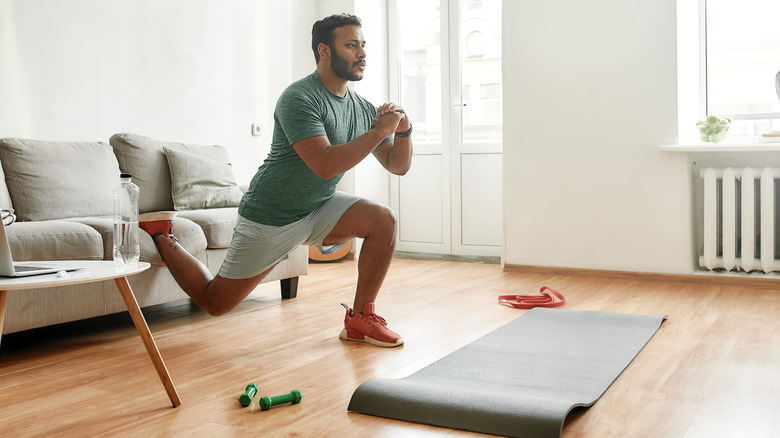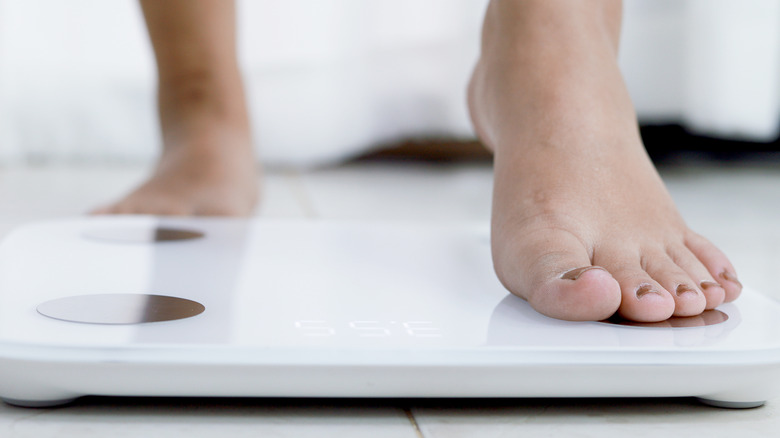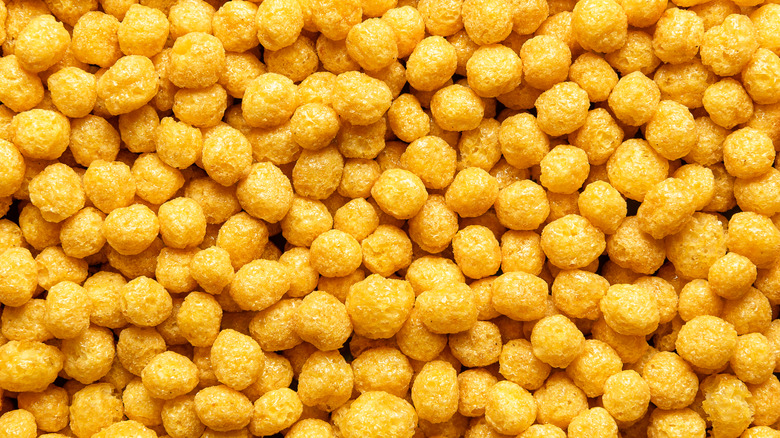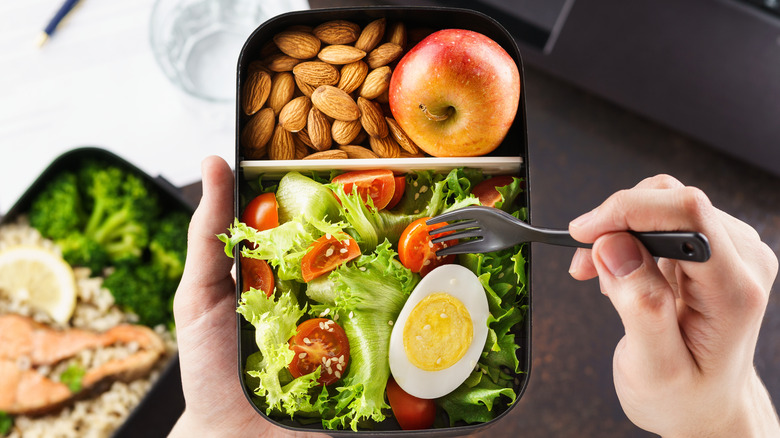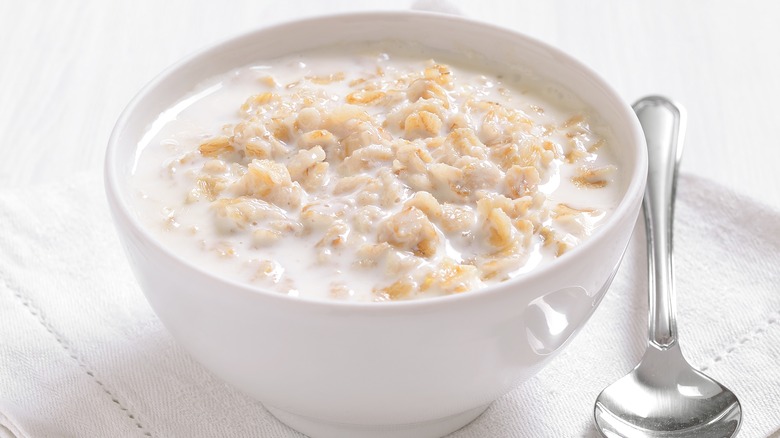Morning Habits That Can Help You Lose Weight
Whether you're a morning person or not, it's difficult to deny that getting up on the right or wrong side of the bed can affect pretty much everything that comes after. "The morning is a critical time that can set the tone for the entire day," says the University of Pennsylvania's School of Medicine's research associate professor in psychiatry Namni Goel, with the way that we prepare ourselves for the hours ahead affecting our mood, our productivity, and both our short and long-term health (via NBC News). And the early hours can also make a difference to our body composition, with certain dietary and lifestyle choices having a strong bearing on our caloric intake for the rest of the day.
But let's face it — some of us are not early birds. And trying to think about how to set ourselves up for dietary success for the day ahead? It ain't easy, folks. That's why we've decided to make it easy for you. Whether you're reading this last thing at night or first thing in the morning, here are the top tips you need to help shape your morning for better overall weight loss.
Open your curtains, and let the natural light in
If you're particularly groggy in the morning and are running late to dash out of the door or hop on a Zoom call, it can be surprisingly easy to leave opening your curtains until the last minute. But prioritizing letting the light into your room can not only affect how good your space looks, but may help you lose weight.
A study published in PLOS One examined the body compositions of adults in relation to how much sunlight they got and when — and the results were pretty amazing. "The earlier this light exposure occurred during the day, the lower individuals' body mass index," Northwestern University Feinberg School of Medicine research associate professor of neurology Kathryn Reid, co-lead author of the study, says (via HuffPost). It was found that getting ample amounts of light in the morning allowed people to regulate their circadian rhythms better, a huge factor in how well and efficiently we can use energy, with the study's authors concluding that getting light between 8 a.m. and noon would help the most.
There's also the fact that if you get more sunlight, you'll be getting more vitamin D, which seems to correlate with being able to manage weight better, per a study published in the Journal of Women's Health.
Start your day with a tall glass of water
What's the first thing you do when you wake up? Jump in the shower? Hit the snooze button, maybe? Well, if "drinking a glass of water" isn't your answer here, then you're missing out on a top trick.
Starting your day with a glass of water can assist you in keeping your hydration levels topped up, an essential factor in weight loss. In fact, a study published in the Journal of Clinical Endocrinology and Metabolism found that for every 500-milliliter glass of water you drink, your metabolic rate can be boosted temporarily by 30%, leading to a higher energy expenditure throughout the day.
And that's not the only reason why remaining hydrated can be great for weight loss. Drinking water can result in you consuming fewer calories overall thanks to its appetite suppressant qualities, and also assists in the metabolization of fats, says Medical News Today. Consuming enough water will also help your body sift waste through, which may reduce overall bloating and keep your digestive system working in good order. And, having a good water intake will mean that your workouts run smoother and more efficiently. Did you get that glass of water yet?
Start your day with a light workout
Some people can spring out of bed, leap into their workout clothes, and set off around the track without a care in the world. Other folks (cough, cough, not us, never) can find that a little more ... Well ... Trying. But if you can stomach the thought of a workout first thing in the morning, we're pretty confident in saying it'd benefit your weight loss journey.
A study published in the International Journal of Obesity examined the effects of working out at different times of the day on weight loss, following a group of participants over ten months. It was found that the participants who exercised in the mornings lost significantly more weight than the group who exercised between 3 p.m. and 7 p.m. Although the study's authors weren't entirely clear about why this was the case, there could be several factors at play, including the fact that working out in the morning generally might give you more energy, improve your focus, and encourage you to make better food choices for the rest of your day (per Healthline).
Take a few minutes to meditate
Aaaaand ... Breathe. We know that starting your morning by meditating might seem a bit strange — after all, you've just gotten out of bed, so why would you already need to destress and relax? — but when it comes to weight loss, there are few things better to add to your routine.
Although meditation itself won't help you lose weight, the impacts of certain practices may encourage you to rethink your relationship with food, says Healthline. Mindfulness practice is especially useful for this, with the meditation allowing you to observe your habits without judgment or self-criticism, therefore encouraging you to notice when you are eating due to emotional triggers.
The usefulness of mindfulness practice for weight loss was observed in a review published in Obesity Reviews, which looked at the impact of various types of meditation on weight management. The researchers conducting the review found that mindfulness practice seemed to be the most helpful for folks trying to lose weight, and in adapting behaviors associated with a weight increase.
Make sure you get your protein in
We know, we know. Breakfast is the most important meal of the day. We've heard it a million times. But there's a reason why people always wax lyrical about the importance of breakfast, people — it truly does set a tone, not least for individuals on a weight loss journey.
And it appears that eating a breakfast that's high in protein is especially useful for weight loss, according to a study published in Nutrition Journal. Researchers found that when people ate protein-rich breakfasts, they experienced fewer cravings after the meal and were able to sustain their appetite more effectively through to lunch, in comparison with people who ate breakfasts with normal protein levels. Why is this the case? Protein is super-filling because it can take longer to digest than carbs, and also thanks to its ability to help suppress ghrelin, a hormone that provokes hunger cravings and leads to us eating more (per Healthline). Including food items like eggs and Greek yogurt in your breakfast, as well as beans and pulses, can give you the boost of protein that you need.
If you have a short journey to work, walk instead of taking your car
We all know how easy it is to leap into your car at the start of the day and turn up at work mere minutes later. But if you live a walkable distance from your workplace, leaving the car keys at home and setting off on foot is an awesome way to assist in weight loss.
Walking might feel like it pales in comparison to other types of exercise for weight loss, but adding in a quick jaunt in the morning, even for just 30 minutes, may allow you to burn up to 150 additional calories per day (per the Mayo Clinic). And if you're walking back from work? Well, you can double that, folks.
The Mayo Clinic does point out that walking for weight loss, while effective, should always be paired with a healthy diet. So what about if you work from home? Well, we've got you covered, too! A quick HIIT working first thing in the morning can get your blood pumping and can be done in a manner of minutes, as Men's Journal shows. Try doing a quick few rounds of squats, jumping jacks, mountain climbers, and a plank before you sit down and start answering those emails. We promise you it'll make your work day a lot more bearable.
Weigh yourself in the morning
For a lot of people, weighing themselves in the morning is not their idea of a good time, especially if you're not feeling too good about yourself. But in fact, incorporating a quick weight check into your morning routine might encourage you to lose more weight overall. Weighing yourself regularly is conducive to higher overall weight loss, according to WebMD. And doing so in the morning — the time of the day when you're probably most likely to follow a set routine — will allow you to develop the habit and generate consistency.
Additionally, if you weigh yourself the moment you wake up, you're seeing your body in its natural state, without any food or drink that might cause your weight to fluctuate. This can help you get a better sense of your true weight and prevents you from seeing the number change depending on what time of the day you're stepping on the scales. Try to go to the bathroom before weighing yourself, ideally barefoot and without clothes on (or with the same clothes you wear every day).
Skip the breakfast cereal
We all love breakfast cereal. It's fun, it's convenient, and it's easy to make (the ideal recipe, in our opinion: milk plus cereal equals done? Sign us up!). But unfortunately, when it comes to weight loss, it's one of the worst things you can put on your table to start your day. Breakfast cereals can be loaded with added sugar, according to Healthline. This additional sugar can lead to us becoming hungry again much quicker, spiking our blood sugar which then results in a dip, making us eat more (per Medical News Today).
The added sugar in breakfast cereals can also wreak havoc on your hormones, leading to leptin resistance that can disrupt your natural eating cycle. And while breakfast cereal excels in sugar content, it unfortunately lacks nutrients and fiber. A lot of breakfast cereals will have added fiber, vitamins, and minerals, but it's always a far healthier choice to go for whole foods that will not only nourish but sustain you through to lunchtime. This way, you won't find yourself reaching for a snack by 10 a.m.
Make yourself a packed lunch
Getting out of the door can be hard enough first thing in the morning without having to think about making your lunch ahead of time, and if you're time-pressed, it can be super-tempting to just grab something on the go. But making a packed lunch is pretty much one of the best things you can do on a weight-loss journey.
According to research published in the International Journal of Behavioral Nutrition and Physical Activity, people who meal-prep generally experience less obesity, and usually have a healthier diet overall. They also have more choice and variety in their diets, which is something we always want to see.
And if you're struggling for inspiration, we've got you. Try a protein-packed lunch box by filling it up with two sliced eggs, some cooked green beans, a sliced chicken breast, and some puy lentils, all of which you can cook up the night before (per Olive). Or, simply throw a few lettuce leaves, falafel, and hummus into a lunchbox and you're good to go (and sprinkling it with pumpkin seeds and some pickled red cabbage for good measure).
Get a little extra sleep
How much sleep did you get last night? Maybe not enough as you'd like — a huge percentage of Americans get way less than is recommended per night (at least seven hours, per the Sleep Foundation). But if you've ever had anyone tell you off for sleeping in, this is your permission slip to do so: As it turns out, having a little extra sleep can seriously assist in weight loss.
When we lose sleep, our bodies also lose the ability to manage our hormone levels optimally. Some of these hormones, leptin and ghrelin, are central to how hungry we feel and how much we eat throughout the day (per the Sleep Foundation). The less sleep we get, the less likely we are to be able to keep these hormones well-balanced, which can lead to a higher appetite and more food eaten.
It's also worth bearing in mind that losing significant amounts of sleep can affect our metabolism, meaning that we burn through the food we do eat slower. And if that wasn't enough, when we sleep less, we're way less motivated to partake in physical activity, meaning our workouts could suffer.
Add some fiber to your breakfast
What we eat first thing in the morning truly sets our tone for the day, and few things can set our hunger levels up to succeed better than fiber.
Fiber is a super-filling nutrient that can keep us satisfied for hours on end when we eat it at breakfast, according to WebMD. The nutrient essentially serves as a bulking component and slows down the speed by which food leaves your stomach, meaning that you're less likely to want to snack (per Healthline).
But saying we need more fiber is one thing; getting it is another entirely. Fortunately, the latter can be extremely easy. Simple breakfasts like oatmeal, in addition to being super-nutritious, are also packed with fiber, with a single cup containing 4 grams of the nutrient, says WebMD. You could also try a plate of scrambled eggs that has spinach or avocado included. The eggs will give you a super kick of protein, while the vegetables will give you the fiber you need to keep your hunger at bay until lunch.
Take note of what you eat in the morning, and track your meals throughout your day
So, you know the score. You get to the end of the day, and you try to remember what you ate throughout it. Lunch, dinner, those are covered — but breakfast? What about everything in between? Hard to remember all of a sudden, isn't it?
Amazingly, not keeping tabs on what you're eating may lead to weight gain, and by keeping a food diary starting at breakfast, you may see your weight loss goals improve (per Healthline). Self-monitoring food intake has been proven to improve the effectiveness of weight loss plans, according to a study published in the journal Obesity.
Understandably, though, keeping a food diary can get vague pretty quickly, and that's why it's important to be as specific as possible, says Family Doctor. Take down each meal or snack you eat by writing down the quantity of the food or drink consumed, the time and place that you did it, whether you ate alone or with someone else, and what you were doing while you were eating. Doing this can help you get a better picture of your eating habits overall, and may encourage you to make healthier choices.
Have a bigger breakfast than you think you need
The idea of a big breakfast might be a little overwhelming to some. And it may also seem counter-productive — after all, if you're trying to lose weight, surely you don't want to eat more, right? Well, as it turns out, eating a bigger breakfast may result in better weight loss overall, according to Healthline.
A study published in The Journal of Clinical Endocrinology & Metabolism examined the difference between diet-induced thermogenesis after certain meals by looking at what happened when people ate bigger breakfasts versus bigger evening meals. It was found that when the study's participants ate a bigger breakfast, they ended up burning over twice the number of calories than if they ate a large dinner. Researchers also found that when people had a larger breakfast, their blood sugar and insulin levels were much more stable throughout the day, and they had fewer hunger pangs for sweet foods. While it should be pointed out that this study was conducted with a particularly small number of participants and a short timespan (only 16 people over three days), it's a promising result that potentially shows that eating a big breakfast could aid weight loss.




